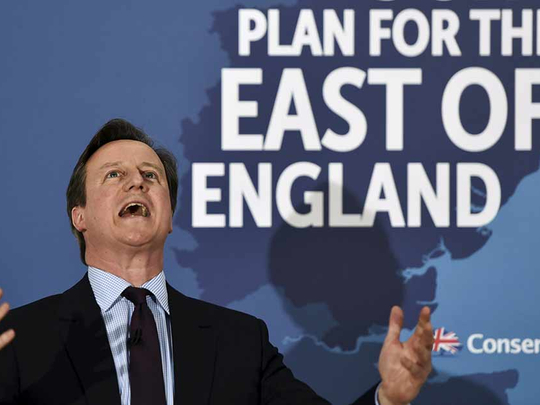
London: British Prime Minister David Cameron courted English voters on Friday ahead of a tight UK-wide election, promising to create a separate rate of income tax for England and to give English lawmakers greater powers.
Attempting to tap into a sense of English resentment about the growing degree of devolution Scotland enjoys, Cameron pledged to enact reforms within a year of the May 7 election.
England is by far the most populous part of the four-nation United Kingdom and southern England in particular has long been a stronghold for Cameron’s centre-right party.
Cameron, whose party had only one of 59 seats in Scotland before parliament was dissolved, is championing reforms to the way the British parliament makes laws to counterbalance extra lawmaking powers promised to Scotland last year to persuade voters there to reject independence.
The September independence referendum brought decades-old grievances to the fore about the current constitutional arrangements which allow lawmakers based in Scotland to vote on laws that do not affect their country.
Cameron said tackling this issue was not about “fragmenting” the UK but about making it stronger.
“If you have the people in one part of the UK feeling like they are getting a raw deal then resentment festers,” Cameron said, launching his party’s first ever ‘English Manifesto’.
Citing the example of income tax, Cameron said it was “unfair” that lawmakers in Scottish seats would be able to vote on tax rates affecting England in future but, once tax powers are devolved to Scotland, the reverse would not be true.
“With English votes for English laws we will put it right,” he said.
Opinion polls show Cameron’s Conservatives are neck and neck with the opposition Labour Party going into the election, with neither likely to win an outright majority.
The Labour Party’s most likely route to power is through an informal deal with the Scottish National Party, something that has generated concern among some voters over the influence Scotland could have over UK-wide policy — an issue the Conservatives are highlighting to bolster their campaign.
“We do not support English nationalists, we do not want an English Parliament, we are the Conservative and Unionist Party through and through,” Cameron said.
“This manifesto simply recognises that the democratic picture has got more complicated in the UK, so beyond our main manifesto, English voters we believe deserve one document, clarifying in black and white what they can expect.”












